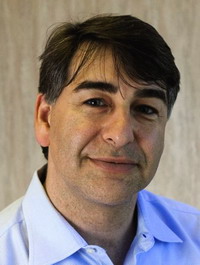Friday, July 11, 2008
Interview with Russell Fine, Opposing Views

Russell Fine is CEO of Opposing Views (www.opposingviews.com), a new startup that recently raised $1.25M from a number of prominent local angel investors. Russell was the founder of Youbet.com, and has been an angel investor himself; we thought we'd catch up with him about his new startup.
What's the idea behind Opposing Views?

Russell Fine: We're going to be launching this summer. The plan is to put out a site for consumers, to help them make better informed decisions, quickly. The model is to focus on consumer issues--things people worry about each day, and bring in experts to discuss them.
How did you decide to start the site?
Russell Fine: I was the founder of Youbet.com, which I left in 2000 after five years. I spent some time as a member of the Tech Coast Angels, investing and mentoring early stage companies. During that time, I had the chance to really look at different tech businesses, and especially those that cross over in the sweet spot of consumer media. The idea for the site came from me going to search for information on a topic, which was important--and where the "wisdom of the crowd" was really not good enough. I did what everyone does -- I searched Google, looked for something relevant in the search, read more about it, tried to find all of the relevant information, and also spent enough time to find out who I thought was presenting all of the facts, and with some of the spin taken out of it on both sides. I made my decision, and said -- it really took a lot of time to do that. To find good information, the burden is still on the consumer.
What's the idea behind tapping experts for your information?
Russell Fine: We're focusing on the questions consumers have that have some personal engagement, and where the wisdom of the crowds is not good enough. You probably won't find a comparison of low cost Nikon digital camera with another camera. But, if you're making a decision on your health, personal finance, or a social decision--where things really matter--you want somewhere you can hang your hat on the credibility of who is speaking about it--that's where you want an expert. That's our reason for focusing on experts. Research shows that when people are making real decisions, the credibility of who that speaker is, and if you can trust them is important.
Can you talk about your investors?
Russell Fine: The investors we've announced include Gil Elbaz, the co-founder of Applied Semantics, which was acquired by Google and became AdSense. He's been very valuable to have on board the company. All of our investors are very active board members, or active with the company. Eric Manlunas of Frontera Capital, who is an early stage investors, and has also been an entrepreneur and CEO, and has been very valuable as well.
Was the Tech Coast Angels involved--it looks like you and several of the others are members?
Russell Fine: They brought in some money. It's interesting, because the major financing comes from Gil, myself, Eric Manlunas, and a couple of others--and we're all current or former Tech Coast Angels members. After we initially funded the company we brought it to the TCA and had a little additional added. The majority of us are affiliated or current TCA members, but it wasn't intended that way.
How big is the team so far?
Russell Fine: We're still growing, if you just count full time employees we're just crossing a dozen. But, if you include everyone else integrated into the enterprise involved it's a much larger staff.
What's the range of topics you intend to cover?
Russell Fine: Our goal is to be relatively wide ranging, like a newspaper. The exciting thing about the business model, is we're at the crossroads of published content--like the New York Times, About.com, and WebMD -- where they pay for content--so that we have their economic model. But, we don't need a lot of people. That's the beauty of the business. We're publishing the quality of experts, so we can use the published revenue model, but we need fewer people because it's user generated, where our users are experts. Much like a newspaper, we'll be multi-channel, covering things like health, finance, politics, and social issues, and we're going to be fairly broad. But, again, we're clearly focused on things that worry people when they wake up in the morning with a decision. If you were given a recommendation by your doctor to take Lipitor, you wouldn't go to the wisdom of crowds--you would go talk to another doctor, because of the medical degree. Anything you'd want a second opinion on is why we're here. In fact, one of the taglines we were kicking around was "Second Opinions on Everything."
How do you go about recruiting experts--it sounds like you don't pay them?
Russell Fine: We don't pay. That's the interesting thing, from the investor perspective. It's an interesting business model, at that crossroads. We've got the revenue model for published content, those folks who are making a lot of money online. But, if you look at the low cost content model--those with large masses of content--those are user generated. We're tapping folks like the NRA, PETA, Code Pink, the Sierra Club, Amnesty International, and a whole bunch of others, who we don't pay, but whose mission is to share their expertise with consumers. We meld the reliability and value proposition with the cost structure of user generated content. That's what makes us a compelling business.